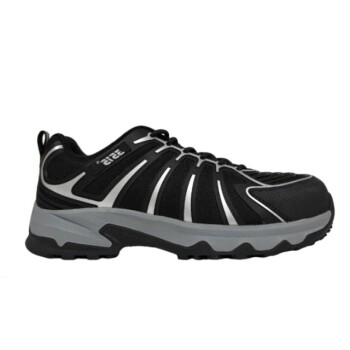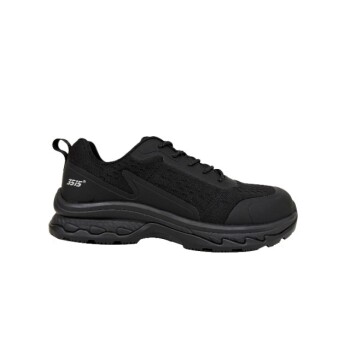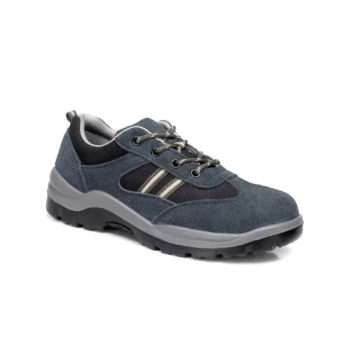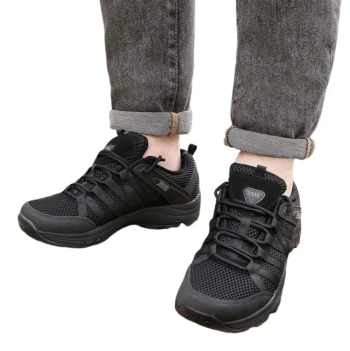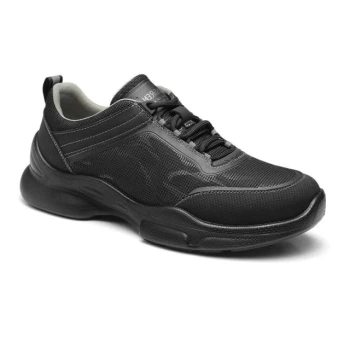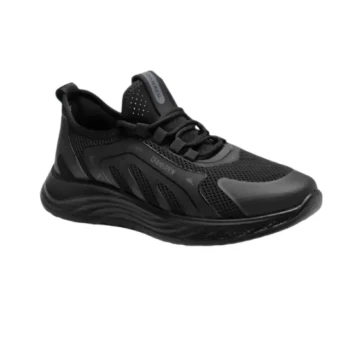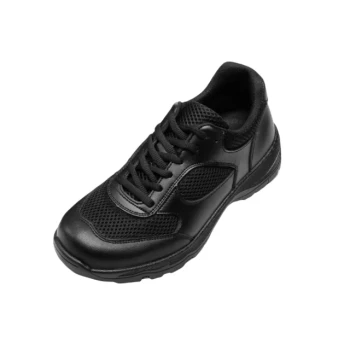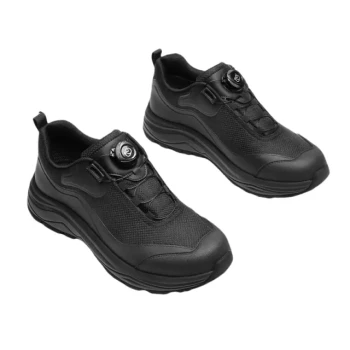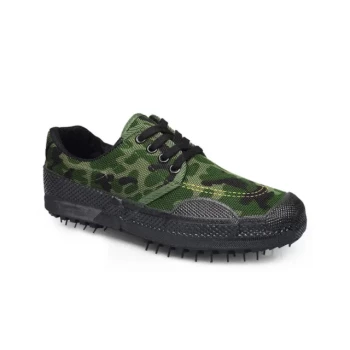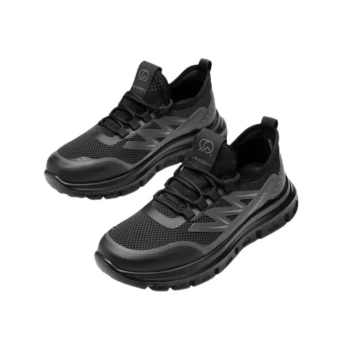When making a final decision on work shoes, you must verify the fit, confirm the shoe's safety features directly match your job's specific hazards, and assess the materials for long-term durability and comfort. The right choice is not just about the size on the box; it's a final check to ensure the shoe is a perfect tool for your unique work environment.
The final decision on work shoes should be treated as a verification process. You are confirming that the shoe’s specific design, safety features, and fit align perfectly with the non-negotiable demands of your daily tasks and environment.
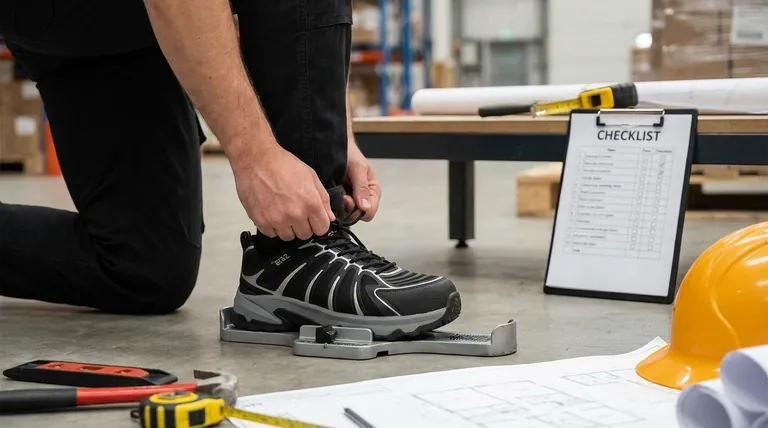
Deconstruct Your Work Environment
Before a final commitment, mentally walk through your workday. The shoe must be built for the reality of your job, not just the general category.
Surface and Hazard Analysis
The sole of your shoe is its most critical point of contact with your environment. Look at its tread pattern.
Deep, interlocked treads are essential for traction on wet or oily surfaces. If you work around sharp objects like nails or metal shavings, puncture resistance is a non-negotiable feature.
Activity and Movement Demands
Consider how you move. If your job involves constant kneeling, a shoe with a durable toecap is essential to prevent premature wear.
For roles that require constant walking or standing, a lightweight design and supportive cushioning will be the difference between comfort and chronic pain.
Environmental Conditions
The environment dictates the material. Waterproof or water-resistant shoes are critical for wet conditions to keep your feet dry and healthy.
For those working near high heat or electrical components, features like Heat Resistance or Electrical Hazard (EH) protection are mandatory safety layers.
Master the Fit: Beyond the Size Number
A poor fit is the most common reason for abandoning a new pair of work shoes. This final check is crucial for your daily well-being.
The 'No Break-In' Rule
Unlike casual footwear, quality safety shoes are built for structure and protection. They do not "break in" or stretch over time. The fit you feel in the store or at home is the fit you will have for the life of the shoe.
Accounting for Your Foot
Your feet are unique. If you have flat feet or high arches, you need a shoe with the appropriate internal support.
Always measure both feet, as they are often slightly different sizes. Make your final decision based on the larger foot, ensuring there is enough width and about a half-inch of space for your toes.
Simulating Work Conditions
The best way to test a potential work shoe is to try it on at the end of the day when your feet are slightly swollen.
Wear the same type of socks you use for work. If possible, walk on different surfaces and mimic common movements like squatting or climbing stairs to reveal any potential pressure points or discomfort.
Understanding the Trade-offs
Every work shoe is a balance of features. Understanding the compromises is key to choosing the right pair for your specific needs.
Safety vs. Comfort
Heavier, more robust safety features, like traditional steel toes, offer maximum protection but can add weight and reduce flexibility.
Modern composite materials offer a lighter alternative that can still meet safety standards, making them a better choice for jobs requiring constant movement.
Durability vs. Flexibility
Rugged, thick materials like leather offer excellent durability and protection but may feel stiff initially.
More flexible synthetic materials might offer greater comfort out of the box but may not withstand the same level of abrasion or chemical exposure over time.
Initial Cost vs. Longevity
Investing in a higher-quality shoe from a reputable brand often means paying more upfront.
However, this initial investment typically pays off in superior durability, better long-term comfort, and the reliability of proven safety designs, saving you money and protecting your well-being in the long run.
Making the Right Choice for Your Goal
Your final decision should be guided by your primary daily requirement.
- If your primary focus is maximum safety in a hazardous role: Prioritize the shoe with the exact safety certifications (e.g., EH, Puncture Resistance) your job requires.
- If your primary focus is all-day comfort for a highly active job: Prioritize a lightweight design, a perfect fit that accommodates your foot shape, and superior cushioning.
- If your primary focus is long-term durability in a harsh environment: Prioritize high-quality materials, robust sole construction, and trusted customer reviews on longevity.
Ultimately, the right work shoe is a piece of personal protective equipment that feels like an extension of your body.
Summary Table:
| Decision Factor | Key Considerations |
|---|---|
| Work Environment | Surface hazards, activity level, weather conditions |
| Fit & Comfort | No break-in rule, foot shape, test with work socks |
| Safety Features | Puncture resistance, EH protection, heat resistance |
| Material & Durability | Leather vs. synthetic, sole construction, longevity |
| Trade-offs | Safety vs. comfort, durability vs. flexibility, cost vs. value |
Need reliable work shoes for your team or brand? As a large-scale manufacturer, 3515 produces a comprehensive range of durable, safety-compliant footwear for distributors, brand owners, and bulk clients. Our production capabilities encompass all types of shoes and boots tailored to your specific work environments. Contact us today to discuss your custom footwear needs and benefit from our expert manufacturing solutions!
Visual Guide
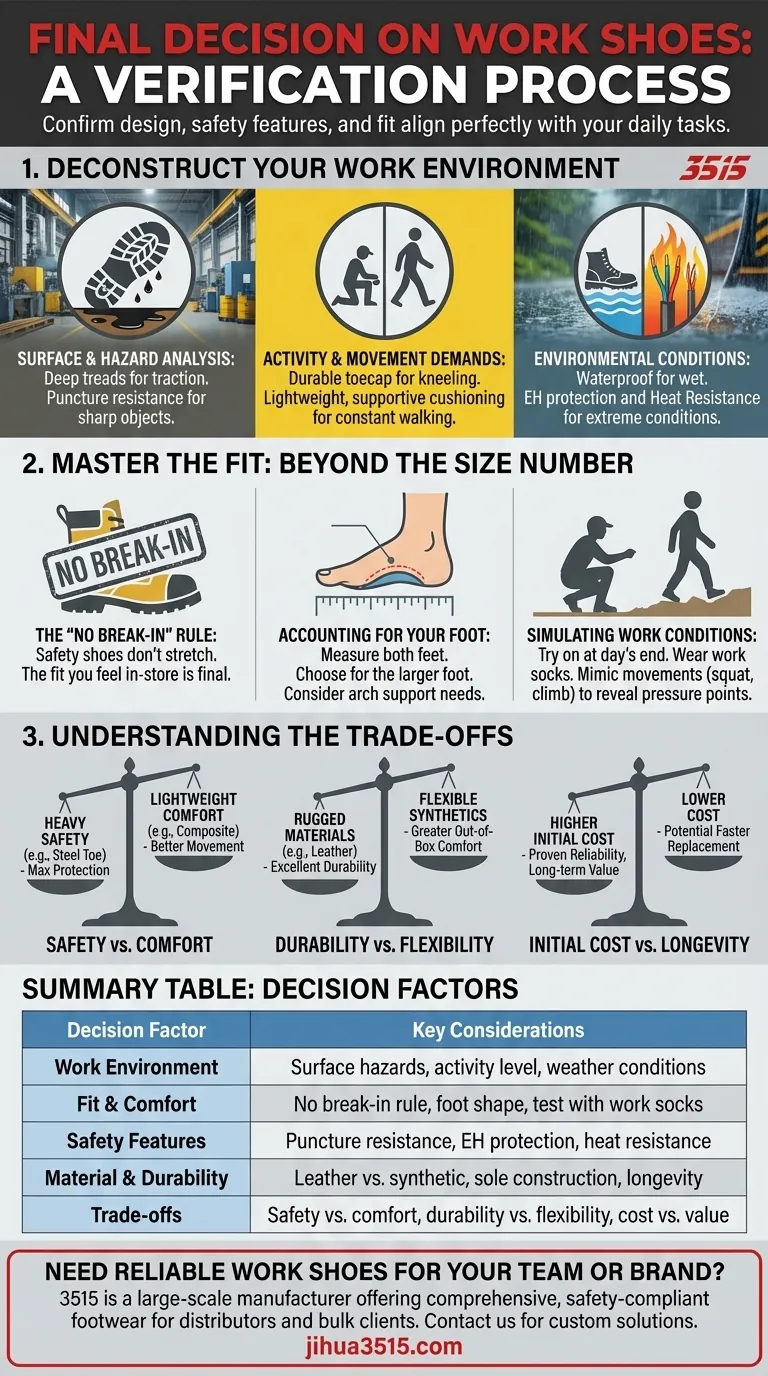
Related Products
- Premium KPU Athletic Safety Shoes for Wholesale
- Durable Rubber-Soled Utility Shoes for Wholesale & Custom Brand Manufacturing
- Premium Lightweight Safety Shoes for Wholesale & Bulk Orders
- Custom Safety Shoe Manufacturer for Wholesale & OEM Brands
- Lightweight Breathable Training Shoes for Wholesale & Custom OEM Manufacturing
People Also Ask
- What role do slip-resistant safety shoes play in high-risk environments? Essential Protection for Industrial Safety
- How does a wide forefoot outsole design contribute to stability? Unlock Superior Balance in Safety Footwear
- How do ISO, EN, and ANSI safety standards differ? Navigate Global Compliance for Market Access
- What type of work shoes are recommended for individuals with flat feet? Find Supportive Footwear for All-Day Comfort
- Why is the provision of individual-specific industrial safety shoes mandatory? Block Pathogens & Secure Your Logistics
- What role do professional safety shoes play in posture? Improve Worker Ergonomics and Prevent Fatigue
- What type of footwear is needed for those working in a foundry? Essential Protection for Extreme Heat & Metal Splash
- What are the EN ISO 20345 norms for safety shoes? A Guide to Choosing the Right Protection
